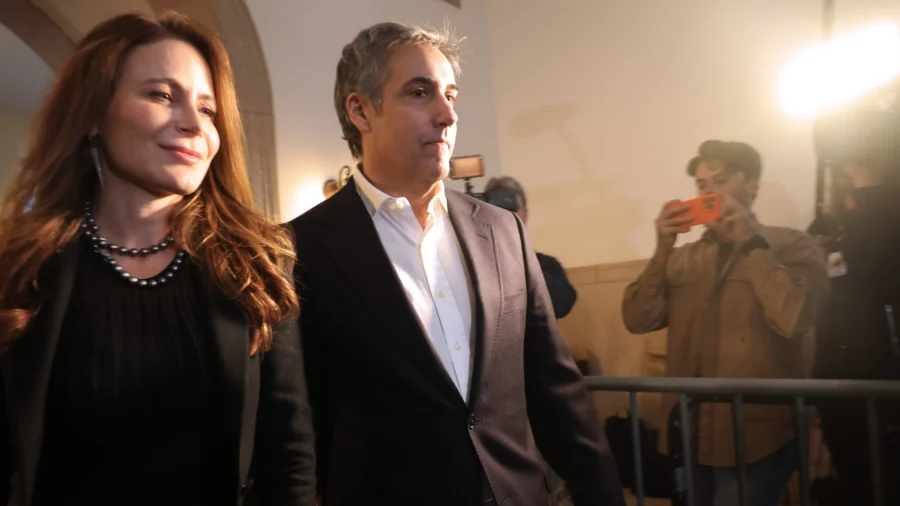A federal appeals court has rejected Michael Cohen’s bid to revive a lawsuit that seeks to hold former President Donald Trump liable for allegedly jailing him in retaliation for writing a book that casts the former president in a negative light.
The 2nd U.S. Circuit Court of Appeals in Manhattan said in an order dated Jan. 2, 2024, that it had considered the arguments laid out in Mr. Cohen’s appeal and found them to be “without merit.”
“Accordingly, we affirm the judgment of the district court,” clerk Catherine O’Hagan Wolfe wrote in the order, on behalf of the court.
Mr. Cohen filed his civil action against President Trump in December 2021, alleging retaliatory imprisonment for his public comments and tell-all book criticizing the former president.
The former president’s lawyer sought damages for alleged “extreme physical and emotional harm” and free speech violations after he was ordered back to prison after completing a three-year sentence for crimes including campaign finance violations, lying to Congress, and tax evasion.
President Trump’s legal team moved to dismiss his complaint and a district court sided with the motion, prompting Mr. Cohen to appeal, leading to Tuesday’s decision denying his bid to revive the lawsuit.
“We are very pleased with today’s ruling,” President Trump’s attorney, Alina Habba, said in a statement to The Epoch Times. “Mr. Cohen’s lawsuit was doomed from its inception. We will continue to fight against any frivolous suits aimed at our client.”
Mr. Cohen reacted to the suit’s dismissal by saying he plans to appeal to the U.S. Supreme Court.
“The outcome is wrong if democracy is to prevail. A writ of habeas corpus cannot be the only consequence to stop a rogue president from weaponizing the Department of Justice from locking up his/her critics in prison because they refuse to waive their First Amendment right,” he said in a statement to media outlets.
Background
Mr. Cohen was sentenced to 36 months in federal prison after pleading guilty in 2018 to a number of crimes, including making improper campaign contributions.
He was also ordered to pay two $50,000 fines and $1.4 million in restitution, and forfeit $500,000 in assets.
“Each crime involves deception motivated by personal greed and ambition,” U.S. District Judge William Pauley said during sentencing on Dec. 18, 2018. “As a lawyer, Mr. Cohen should have known better.”
Mr. Cohen claimed he made false statements before Congress and improper campaign contributions to help conceal an alleged affair between President Trump and an adult film star and to conceal efforts the Trump organization had made to develop property in Moscow, a project that hasn’t come to fruition.
After serving about a year of his sentence, Mr. Cohen was freed early to home confinement amid a COVID-19 outbreak in federal prison. However, weeks later he was sent back to prison, where he said he spent 16 days in solitary confinement that left him with anxiety, severe headaches, and shortness of breath.

He was later freed to home confinement on the orders of a judge who said his jailing was retaliation for his desire to publish a memoir critical of President Trump and to discuss the book on social media.
After completing the remainder of his sentence from his posh Park Avenue apartment in November 2021, Mr. Cohen officially became a free man and vowed to work with law enforcement to “ensure that others are held responsible for their dirty deeds and that no one is ever believed to be above the law.”
About a month later, Mr. Cohen sued President Trump and then-Attorney General William Barr, along with some prison and probation officials.
He alleged that the revocation of his furlough and home confinement, as well as remand in solitary confinement, violated the Eighth’s Amendments protection against cruel and unusual punishment.
Since then, he has also released his book, launched a podcast, and made multiple television appearances bashing the former president.
Dismissal and Appeal
In November 2022, a district court judge dismissed Mr. Cohen’s lawsuit.
At the time, he said he disagreed with the judge’s ruling, telling media outlets in a statement that “granting this motion prevents me from obtaining documents that would expose what happens when you have a corrupt president who weaponizes the DOJ through a complicit Attorney General.”
In December 2023, Mr. Cohen appealed the decision to the 2nd Circuit, asking the court to revive his lawsuit against President Trump.
Jon-Michael Dougherty, an attorney for Mr. Cohen, pointed to U.S. Supreme Court case Bivens v. Six Unknown Named Agents of the Federal Bureau of Narcotics, which awarded damages after agents of the federal bureau gained entry into Mr. Bivens’ home without a warrant and arrested him on drug charges.
However, the 2nd Circuit found that Mr. Cohen’s claims were not valid and the Bivens precedent doesn’t apply, in part because he had other forms of judicial relief available and was “successful in pursuing other forms of judicial relief.”
“Cohen therefore does not have a viable claim for damages under Bivens for the alleged violations of his Fourth and Eighth Amendment rights,” the Jan. 2 court order reads.
From The Epoch Times

